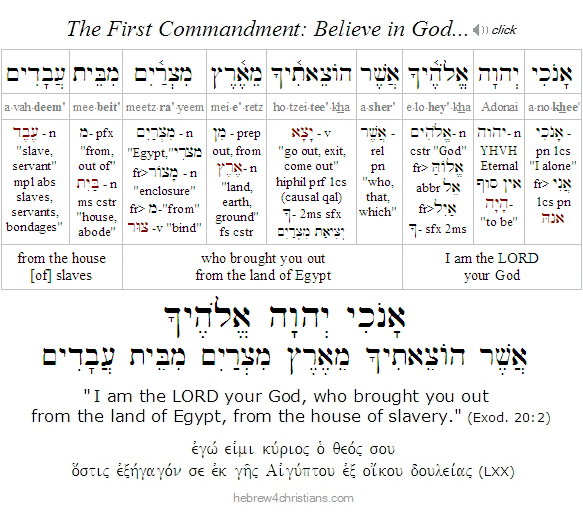|
|
|||||||||||||||||||||
 |
|||||||||||||||||||||
 |
|||||||||||||||||||||
|
|
||||||||||||||||||||||||||||||||||||||||||||||||||||||||||||||||||||||||||||||||||||||||||||
|
When the Jewish people exclaimed at Sinai, kol asher dibber Adonai na'aseh ("all that the LORD speaks we will do" [Exod. 19:8]), they signified an abandonment to God's will for their lives. In other words, they first chose obedience to God's voice before they understood the language (or terms) of the covenant. Only later, after Moses wrote the book of the covenant (sefer habrit) did they add v'nishmah (and we will hear/obey [Exod. 24:7]). The Jewish people first chose to do whatever the LORD commanded and then hoped to "hear" these words in order to understand their meaning. As Anselm said, we believe in order to understand. The decision to serve God comes first, and then comes understanding. |
|
And God spoke all these words, saying: (Exod 20:1) |
||||||||
|
"All these words" |
||||||||
|
Notice that the prelude to the giving of the Ten Commandments begins with the statement that "God spoke all these words." Jewish Midrash states that the Ten Commandments were spoken all at once, in a single divine utterance, and then repeated one-by-one to the Israelites. The earth was said to have been completely silent, and even the waters from rivers ceased flowing. |
||||||||
|
Ha'diber Ha'rishon |
||||||||
|
The first commandment is the most important of them all, for from it derives the authority for all of the others. The statement, anokhi Adonai eloheykha, "I am the LORD your God" includes the idea that there is only one God, who is Judge and Master of the universe. |
||||||||
|
The First Commandment and Eternal Life... |
||||||||
|
Do you see how this First Commandment -- to accept and receive the LORD as your God -- implies faith in the resurrection from the dead? When the LORD says, Anokhi Adonai Elohekha (אָנכִי יְהוָה אֱלהֶיךָ) - "I AM the LORD your God" - he invites you to join the life that He Himself lives, that is, Eternal Life... He is the "Living God" (אֱלהִים חַיִּים), the Source and LORD of all Life. When you hear "I AM the LORD your God" as personally spoken to you, then you are made a child of eternal promise, and even should heaven and earth melt away in fervent heat, you keep faith that nothing can separate you from the care and love of your heavenly Father (Rom. 8:31-39).
|
|
|
|
|
|
|
Hebrew for Christians |
|||||
|
|||||


